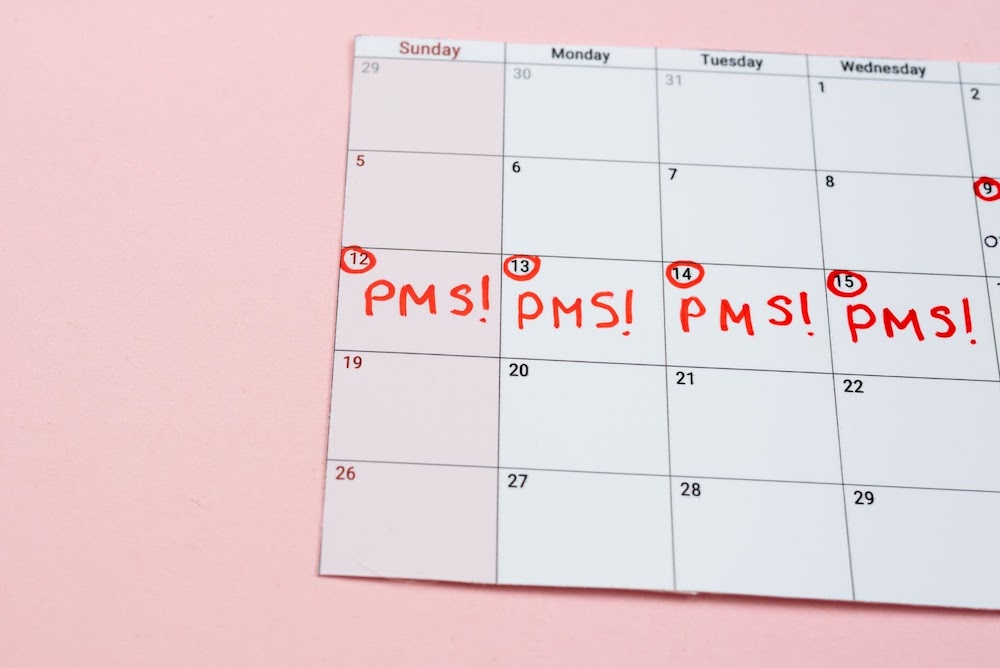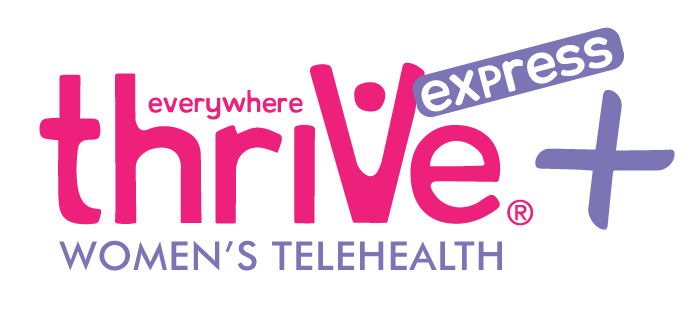Having trouble with PMS symptoms?
I hope you’re doing well! PMS can be a huge drag, right? At ThriVe+, we get it— dealing with the ups and downs of your menstrual cycle can be pretty confusing. And if you’ve been sexually active, it could feel extra confusing — PMS and early pregnancy symptoms can seem like they’re playing the same tune. I’m here to help you figure out what’s going on with your body. Each of us is different, after all! You deserve answers. Let’s get you taken care of with the info you need to manage it all like a boss.
What’s up with PMS?
Premenstrual syndrome (PMS) hits a lot of us girls in the week or two before our periods, and can last through the first few days of menstruation.1 We’re talking about things like bloating, headaches, sore breasts, acne flare-ups, cramps, mood swings, and feeling more anxious or down than usual.2, 1 For some women, PMS can be limiting. If you’ve got PMS symptoms that limit your daily activities or impact your ability to work, I’m glad you’re here. There are ways to manage many of these symptoms. First though, let’s talk about why PMS happens in the first place.

Why does PMS happen?
The exact causes of PMS aren’t completely clear. But here are some of things that may contribute:
1. Hormonal roller coaster: Hormonal changes are part of your monthly cycle. Some of these changes probably cause PMS symptoms.2
2. Brain chemistry: Serotonin, the “feel-good” brain chemical, also fluctuates during our cycles and can make us feel pretty blah.2
3. Hidden depression: Some women might have undiagnosed depression that gets worse with PMS.2
Does any of that resonate? If you’ve been feeling depressed, or feel like you might have a hormonal imbalance that’s out-of-the-ordinary, it’s a good idea to talk to your doctor.
How can you deal with PMS?
Like we mentioned earlier, PMS is probably NOT your favorite. But there are ways that you can make your PMS symptoms more manageable:
1. Treat yourself: Relax with a nice massage, do some gentle yoga, and make sure you’re getting enough sleep. 3
2. Pain relief: Over-the-counter meds like ibuprofen can help with cramps and breast discomfort.3
3. Stay active: Regular exercise boosts your mood and energy levels. It helps with bloating too! This is a huge one.3
4. Chill out: Stress reduction techniques like meditation, deep breathing, and mindfulness can actually make a big difference in PMS symptoms.1
If these strategies aren’t working for you, please talk to your doctor. There are other paths to improving your symptoms like medications, natural supplements, and lifestyle changes. Talk to your doctor to find out what might work for you. You shouldn’t have to live with severe PMS symptoms impacting your life. You deserve confidence in your health.
Some women wonder if they could be pregnant when they get these symptoms. If you’ve been sexually active and think you might be pregnant, we’re here for you. ThriVe+ is a safe place to ask questions about pregnancy, sexual health, abortion, and pregnancy. We’re here to support you with the information you need. We’re going to discuss some basic info about the differences between PMS symptoms and pregnancy to get you some clarity.
PMS vs. early pregnancy
Some PMS symptoms and pregnancy symptoms overlap — and that can make things super confusing. Here are some of the symptoms that are common in both PMS and early pregnancy
– Sore breasts, fatigue, appetite changes, and mood swings can show up with both PMS and pregnancy.2, 4
– A missed period is a big pregnancy hint. Plus, nausea and vomiting (morning sickness) are early pregnancy signs that you don’t usually get with PMS.4
Questions to ask yourself:
Okay, so which one might you be experiencing? PMS symptoms or pregnancy? Whatever it is you’re going through, we’ll be here for you at ThriVe+. We have no-cost, lab-quality pregnancy tests to get you answers — quick. To help figure out if you’re dealing with PMS or early pregnancy, ask yourself these questions:
1. Have I been sexually active?
– If you’ve been sexually active, pregnancy could be a possibility.
2. Have I missed a period?
– Missing a period is one of the most telling signs of pregnancy.
3. Am I feeling nauseous or vomiting?
– Morning sickness is common in pregnancy, but not usually in PMS.4
4. Are my breasts sore?
– Sore breasts can be a sign of both PMS and pregnancy. Consider other symptoms too.1, 4
5. Do I feel super tired?
– Fatigue can happen with both, but if you’re feeling unusually exhausted with other symptoms, it might be a good idea to take a pregnancy test.
6. Have I had any food cravings? Aversions?
– Strong food cravings or aversions can be associated with both PMS and pregnancy.1, 4 If you’ve been sexually active, consider taking a pregnancy test.
7. Is my mood all over the place?
– Mood swings can occur in both PMS and pregnancy, so check for other symptoms.1, 4
8. Do I have cramps?
– Cramps are some normal PMS symptoms, but they can also happen in early pregnancy.1, 4 But if they’re accompanied by other pregnancy symptoms, take note.
9. Am I bloated?
– Bloating is common with PMS, but if it’s persistent and you have other pregnancy signs, consider a test.2, 4
Why you might need to get a pregnancy test
If you’ve been sexually active and you think you might be pregnant, getting tested is a big deal. It could just be PMS symptoms, for sure. But if you’re worried and have missed a period, consider testing. Even if you’re considering abortion, it’s really important to get tested for a few reasons:
1. Health first: Early detection means you can start prenatal care ASAP. It’s crucial for your health during pregnancy. This includes things like prenatal vitamins, avoiding certain substances, and managing health conditions. Your health matters when you’re pregnant, even if it wasn’t planned, and even if you aren’t planning on continuing it.
If your pregnancy isn’t developing where it should, your health could be in serious danger. Please, pursue care for yourself while you’re pregnant and get an ultrasound so you can make a safe choice for your health.
2. Clarity is key: Knowing if you’re pregnant helps you make informed choices about your health and lifestyle. Getting an ultrasound will get you more answers about the options available to you. Whether it’s abortion, adoption, or parenting, looking into your health is vital.
3. Peace of mind: Not knowing can be super stressful. A pregnancy test gives you clear answers so you can plan your next steps, whatever those might be for you.
PMS symptoms getting you down? Hopefully, now you feel better equipped to seek out the care you deserve. Think you could be pregnant? At ThriVe+, we offer no-cost, lab-quality pregnancy tests to give you accurate and quick results. Our team is here to support you, no matter what. Our services are by women, for women. We aren’t here to make a decision for you, ever. We’ll get you the medically-accurate info need to make your own authentic decision. There is hope for you.

If your symptoms align more with PMS symptoms, there’s hope for you, too. Bring the list of your symptoms to your doctor so you’ll be equipped to have a good consultation. You deserve to experience good health and confidence! Keep learning about your body and pursuing the care you deserve.
You’ve got this, and we’re here to help. If you have any questions or need more info, don’t hesitate to reach out.
Sources:
1 Premenstrual dysphoric disorder: Different from PMS? – Mayo Clinic
2 Premenstrual syndrome (PMS) – Symptoms & causes – Mayo Clinic
3 Premenstrual syndrome (PMS) – Diagnosis & treatment – Mayo Clinic




